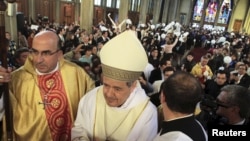Parishioners in a southern Chile diocese are gathering wherever their new bishop appears, but their presence is not the sort of assembly the Catholic Church would expect.
In the month since Bishop Juan Barros was installed in Osorno, the priest has had to sneak out of back exits, call on riot police to shepherd him from the city's cathedral and coordinate movements with bodyguards and police canine units.
Such is the public routine of the bishop who is denounced by his opponents as having shielded Chile's most notorious pedophile priest. For his part, Barros said relations are improving.
The appointment of Barros by Pope Francis has unleashed an unprecedented protest, with more than 1,300 church members, 30 diocesan priests and nearly half of Chile's Parliament sending letters urging the pope to reconsider.
Sex abuse accusations
At least three men say Barros was present when they were sexually molested in the 1980s and 1990s by the Rev. Fernando Karadima.
Karadima was sanctioned by the Vatican in 2011 for sexually abusing minors, ordered to live out his life cloistered in a nun's convent. Barros has said he knew nothing of Karadima's abuses.
The controversy is being watched by victims, advocacy groups and lawmakers as a test of the pope's promises to crack down on clerical sex abuse. On April 12, members on the pope's sex abuse advisory committee traveled to Rome to voice their concerns.
The pope has not spoken publicly about the case. In late March, however, the Vatican released a statement defending Barros, saying the Congregation for Bishops examined his candidacy "and did not find objective reasons to preclude the appointment."
But many of the Catholic faithful in Osorno, 820 kilometers (510 miles) south of Santiago, are holding to their protest, which they say is gathering support.
"We are beginning to energize our movement and make it more mainstream," said Mario Vargas, 52, a sex-abuse survivor and one of the leaders.
On April 10, some 600 people protested outside the Osorno cathedral holding black umbrellas, a color they said represented the stain of sex abuse on the church. The action drew Catholic school teachers as well as community members.
"New faces are joining the protests," said Juan Carlos Claret, one of the organizers.
'Good understanding'
Barros, who declined repeated requests for an interview, has said the situation has improved since his March 21 installation. He told reporters last week he had met with parishioners and priests in 10 communities and there was "a good understanding and the love of God reigns."
Barros, previously chaplain of Chile's armed forces, has celebrated Mass a half-dozen times, including during Holy Week, but parishioners say attendance is down and the bishop must travel with a police escort to keep protesters at bay.
"You can feel something sour that transcends all kinds of church activities," said Carlos Meza, a 43-year-old parishioner. "It's not just during Masses."
An April 8 meeting between Barros and parishioners fell apart when the bishop showed up with two body guards and police dogs, a move the parishioners said was unnecessarily aggressive.
On a video recorded at the scene and reviewed by the AP, a woman in the group is heard yelling: "We are a pacific lay movement. You can't push us around like this."
Barros joined other bishops last week at a seminary held by the Catholic University in Santiago. About 50 protesters calling for his resignation were out front, but Barros avoided them by exiting through a back door.
Canon law experts say rescinding an appointment would be unprecedented, so Barros likely is there to stay unless he resigns. So far, there is no indication he plans to do so.




